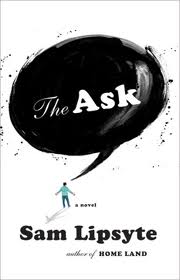Lipsyte, Sam (2010). The Ask. New York: Farrar, Straus & Giroux.
A book universally acclaimed as “hilarious” is usually disappointing. There are some funny lines and scenes in The Ask, to be sure, and it is well-written:
“Our intimacy was largely civic. We spoke at length about our shared revulsion for the almost briny-scented, poop-flecked plunger under the bathroom sink, and also of a mutual desire to cut down on paper towels, but we never broached topics like hopes, or dreams.” (p. 13)
“’Dean,’ said Vargina. ‘This is the man we were telling you about, Milo Burke.’
‘Nice to meet you.’ We’d met a dozen times before, at lunches, cocktail receptions. He had stood beside me while his wife explained a project she’d embarked upon in her student days, something to do with Balinese puppets and social allegory. (p. 23)
“I woke up with a heart attack…Maybe it was not a heart attack. Maybe in fact it was Bernie, lying between us in bed, nursing, firing mule-kicks into my sternum…’Baby,’ I whispered. ‘What the hell are you doing? You weaned him. He’s weaned.’
‘We’re snuggling.’
‘He’s sucking.’
‘No, he’s not.’
‘I’m not,’ said Bernie.
‘Maura, come on, stop it.’
‘It’s okay. It’s just a little regression. It’s normal. I read about it.’…” (p. 86)
This is a novel, about Milo, an incompetent fund-raiser at a nonprofit foundation for the arts. “The ask” is the potential donor you are pursuing for a contribution, which is known as “the give.” But Milo cannot get past the cynicism of it. The novel is thus a social satire, combined with the story of one loser’s inability to make a life that works, economically, or interpersonally. I worked for a nonprofit for a decade (not as a fund-raiser, thank God), so I feel Milo’s pain, but even with my predisposition to connect to him, I remained detached. I found the story boring, and the humor sophomoric.
Milo and his wife are revulsed by the poop-flecked plunger under the sink. Is that funny? Yeah, in a puerile way. “Poop-flecked plunger” is a very fine phrase. The level of observational detail is good. And I appreciate remote associations, which are funny (Balinese puppets, etc.). But after a few pages of this sort thing, my attention drifts.
I think the problem with in-your-face humor is that the book becomes all about the clever writing and that keeps the reader at arms’ length from the story. Is that a hazard for any novel that aspires to be humorous? I can think of several novels that do not suffer this fate (e.g., Christopher Moore’s A Dirty Job, Adam Langer’s Thieves of Manhattan), so my conclusion is that Lipsyte’s attempt to write a humorous novel was simply not successful. Not for me, anyway.

